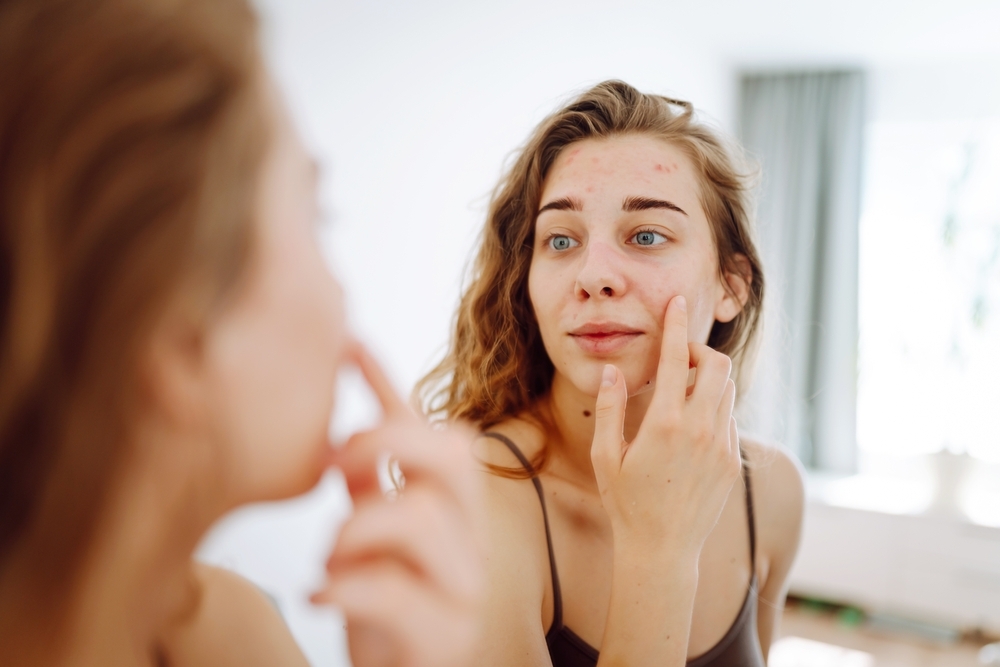One of the biggest misconceptions about sun and skin health is that sunscreen causes acne. If you have oily or sensitive skin, it's normal to want to stay away from heavy products that might clog pores or irritate your skin and lead to more breakouts. Avoiding sunscreen might seem like your best option. But can sunscreen cause acne?
The reality is that sunscreen's benefits extend beyond protecting your skin from cancer. Choosing a formula that's compatible with your skin can actually do wonders for acne-prone skin.
Can Sunscreen Cause Acne?
The short answer is maybe—depending on the sunscreen. Thick, oily sunscreens can clog pores and contribute to acne breakouts, so look for nourishing, oil-free, noncomedogenic formulas. When you see "noncomedogenic" on a sunscreen label, it means it won't clog your pores.
Consider your skin care routine, too. Like makeup, you need to wash off sunscreen at the end of the day. If you don't, your skin develops a greasy buildup that can lead to pimples.
The most important takeaway is that sunscreen doesn't have to cause acne. In fact, when you use the right one, it can actually help improve acne.
How Sunscreen Can Help Improve Acne
Daily sunscreen use helps prevent skin cancer and visible signs of premature skin aging, like wrinkles and age spots. It can also help clear up acne—even if you have acne-prone or oily skin. Here are some ways sunscreen can help keep pimples at bay.
Regulate Oil Production
Ultraviolet (UV) rays can damage the skin's natural barrier, leading to water loss and dry or dehydrated skin. When this happens, the skin overcompensates with excess oil production—which can lead to breakouts. Wearing sunscreen helps prevent this snowball effect by protecting your skin barrier and maintaining adequate skin hydration.
Reduce Inflammation
Many sunscreens include antioxidants and other ingredients—like Zinc Oxide—that lower inflammation and soothe skin. This same property also helps treat and prevent pimples.
Prevent Acne Marks (Post-Inflammatory Hyperpigmentation)
For many people, acne marks (also called post-inflammatory hyperpigmentation) are just as bad—if not worse than—the acne itself. When you apply sunscreen every day, it can help prevent dark spots from forming or getting worse.
Finding the Right Sunscreen for Your Skin Type
As with anything in skin care, it's all about finding the right product for your skin type. If you tend to break out, opt for a lightweight, nongreasy formula that's oil-free and noncomedogenic.
Look for Acne-Fighting Ingredients
The next step is to look for sunscreen that contains acne-fighting ingredients, like Zinc Oxide and Niacinamide.
Studies show that active sunscreen ingredient Zinc Oxide has anti-inflammatory properties and can treat redness and acne. Niacinamide is another superhero ingredient that comes with loads of skin benefits, including anti-inflammatory properties. One literature review showed that Niacinamide significantly reduced participants' acne in six out of eight studies.
EltaMD UV Clear Broad-Spectrum SPF 46 combines these ingredients in a lightweight, oil-free formula that won't clog pores. Its calming, protective qualities also make it suitable for rosacea.
Sunscreen's Other (Major) Benefits
Some sunscreens can help treat and prevent breakouts. But that's not the only reason to get serious about building a daily habit. The primary reason to continue using sunscreen daily is to protect your skin from the sun's harmful UV rays. According to the Skin Cancer Foundation, regular sunscreen use can reduce squamous cell carcinoma risk by about 40 percent and lower your risk of melanoma by about 50 percent.
The Foundation of Radiant Skin
If you have severe acne, like cystic acne, consult a Dermatologist. They can evaluate your skin and develop a treatment plan, which may include prescription medications. When it comes to supporting healthy skin at home, it's all about developing good habits. Start by finding the right sunscreen formula for your skin type, use an SPF of at least 30, and follow application best practices.
The next time you question whether using sunscreen will cause another frustrating breakout, have no fear. You can use sunscreen knowing that it will not only help prevent skin cancer but also support calm, clear, healthy-looking skin.

